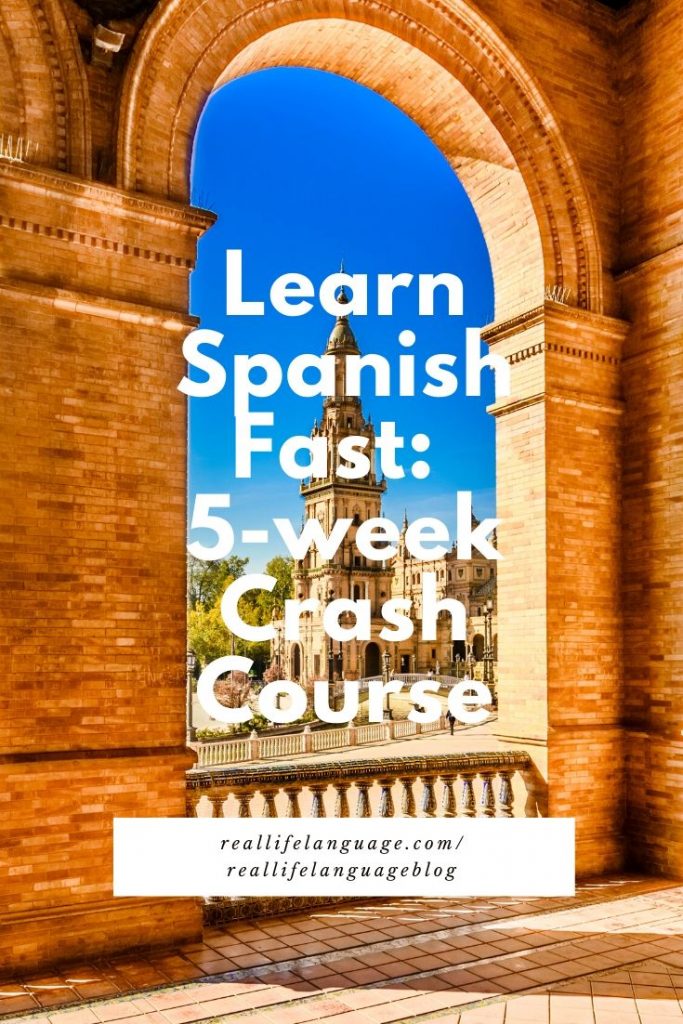
Learn Spanish fast: 5-week Crash Course
Can you learn Spanish fast? Not to complete fluency. However, you can make a great deal of progress in the next five weeks with an investment of time each day.
How long does it take to speak Spanish take?
Quick review- This is a hugely important factor in learning a language, time. To learn basic Spanish (it’s really closely related to English) you can invest between 750 and 1,000 hours of focused, immersive, input and practice, and hit a very basic level of fluency. Those hours are researched-based. They’re done by the US government, and they’re used to prepare people for their missions in embassies and counselors abroad.
Most of us aren’t like these people, however, where we get uninterrupted time to focus on learning a new language and do nothing else. However, I think it’s a really good rule of thumb to give an idea of how long it takes to learn to speak a language.
Each week you will learn a new theme presented in chunks. Communicative themes and chunks are critical pieces to learning a new language.
This week’s lesson- Learn Spanish fast for getting around
| Subway | el metro |
| Train | el tren |
| Bus | el autobus |
| Taxi | el taxi |
| I need to go to ___________, please. | Necesito ir a ________, por favor. |
| Where is the ticket office? | ¿Dónde está la taquilla? |
| Where can I buy a ticket? | ¿Dónde puedo comprar un billete? |
| One ticket, please. | Un billete, por favor. |
| Where is the bus stop? | ¿Dónde está la parada de autobuses? |
| How much does it cost to the city center? | ¿Cuánto cuesta ir al centro de la ciudad? |
| How much does it cost to the airport? | ¿Cuánto cuesta ir al aeropuerto? |
| Here, please. | Aquí, por favor. |
| Where is the closest subway stop? | ¿Dónde está la parada del metro más cercana? |
| I’d like to rent a car, please. | Me gustaría alquilar un coche, por favor. |
| A small car. | Un coche pequeño. |
| A medium car. | Un coche mediano. |
| A big car. | Un coche grande. |
| I would like a ticket to ___________. | Quisiera un billete a______. |
| I would like a round trip ticket. | Quisiera un billete de ida y vuelta. |
| At what time _________? | ¿A qué hora______? |
| Is it close? | ¿Está cerca? |
| Is it far? | ¿Está lejos? |
| Turn left. | Doble a la izquierda. |
| Turn right. | Doble a la derecha. |
| Go straight. | Siga recto. |
| Do you have a map? | ¿Tiene Ud. un plano de la ciudad? |
Remember to get practical. Will you do Goldlist?Task notebooks?
Track your time each day that you’re working on your language skills. We’re human beings. Life gets in the way, but there’s certainly time that we can all find- waiting in line, getting your car washed. Pull out your phone or your notebook, or your phrase book- whatever it is that you’re using to learn a language, and invest 20 minutes, or 30 minutes, here and there. The time all adds up. Even if you don’t do it perfectly over the next five weeks, you’re going to see pretty direct correlation between the amount of time you invest and your progress.
I share ideas on Pinterest and Instagram, too.
My strange podcast.
If you are wondering why there is a download file below, it is a word in Spanish.
We learn languages most effectively in chunks–meaningful words and phrases to communicate right away.
Want the free audio? Spanish for Travel and Beginners free book with linked audio. Get yours here: https://reallifelanguage.lpages.co/spanish-for-travel-and-beginners-/
Looking to get started in Spanish? Try learning some survival tasks. Get the free guide here:
https://reallifelanguage.lpages.co/survival-language-checklist/
Learning a new language is FUN!! Check out 20 ways to learn a language and have fun doing it:
https://reallifelanguage.lpages.co/20-fun-activities-to-learn-a-language/
Want to master a language in the next year? Check out the course here: https://real-life-language.teachable.com/p/the-5-week-linguist
Podcast: Play in new window | Download
Subscribe: RSS